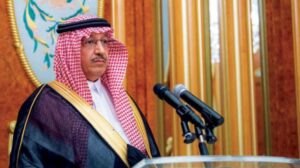
AUS-RIYADH/SA
Saudi Minister of Education Yousef Al-Benyan said that the three-semester system is under the ministry’s evaluation and study and the results of the study will be announced upon its completion. “This is a very important matter at the level of the minister and the ministry, as well as at the government level,” he said.
Al-Benyan said this while replying to a question from Dr. Aisha Zakri, head of the Education and Scientific Research Committee, at the Shoura Council session, chaired by Speaker Sheikh Abdullah Al-Sheikh in Riyadh on Wednesday. “The Ministry of Education is working to evaluate the three-semester experience according to scientific and educational foundations in partnership with teachers, parents, and relevant authorities, and the ministry will announce the result of this study after its completion,” he said.
In his speech, the minister told the Shoura Council that the higher authorities have been tasked to carry out studies about the positive impact and challenges involving the three semesters. There are specialists from various agencies within the Ministry of Education and from outside the ministry, who are carrying out studies about the extent of benefit from the three semesters, their opportunities and challenges,” he said. The ministry introduced the three-semester system at the level of public education during the last academic year. The ministry has divided the academic year into three semesters instead of the previous two semesters, with 13 weeks for each semester.
During the session, the minister briefed the Council members on the major education files. He also answered the members’ inquiries, listened to their proposals, and explained what the ministry had done in the past and announced the ministry’s future plans and programs.
Al-Benyan thanked Custodian of the Two Holy Mosques King Salman and Crown Prince and Prime Minister Mohammed bin Salman for the great care and support that the education sector receives from them, saying that this support is a major drive for achieving the sustainable development goals, one of the basic pillars of Saudi Vision 2030, and the objectives of the Human Capacity Development Program. “There is a major shift in the performance of education in Saudi Arabia, as the Ministry of Education has moved from being an operator to a regulatory body. The educational system has become more flexible and rapid and enhances integrated teamwork,” he said.
Al-Benyan said that the ministry is keen on the teacher to acquire a clear future vision, as it is the foundation for developing education and contributing to building a globally competitive generation with a high level of training apart from teaching skills and capabilities.”
He stressed that the curricula in Saudi Arabia keep pace with international standards, and are developed with the participation and interaction of relevant authorities in formulating the thoughts, skills and values of Saudi students so that the curricula are more modern and diverse, and meet the requirements of the skills of the twenty-first century, the fourth industrial revolution and the new economy.
Al-Benyan confirmed that the Ministry of Education paid great attention to serving people with special needs enrolled in educational institutions, noting that the percentage increase from 42 percent in 2020 to 72 percent in 2023. He stated that the ministry is developing policies and controls that serve the educational process for students with disabilities, and is preparing educational plans and programs that aim to achieve one of the sustainable development goals of providing comprehensive, equitable quality education for all and enhancing lifelong learning opportunities for all, in keeping pace with the Saudi Vision 2030.
Regarding the university education system, Al-Benyan explained that the ministry worked to strengthen the role of the Universities Affairs Council to carry out its tasks in organizing university education and developing its system, bridging the gap between its outputs and labor market requirements, and promoting scientific research and innovation. “The ministry is working as a team, side by side, to overcome the challenges faced by it with a search for sustainable solutions for them,” he pointed out.
Replying to a question about the expansion of special education programs for students with disabilities, the minister said that the highest percentage of employment in educational positions offered this year compared to previous years was for people with special needs. “We have established in the ministry a special department to manage this file,” he added


